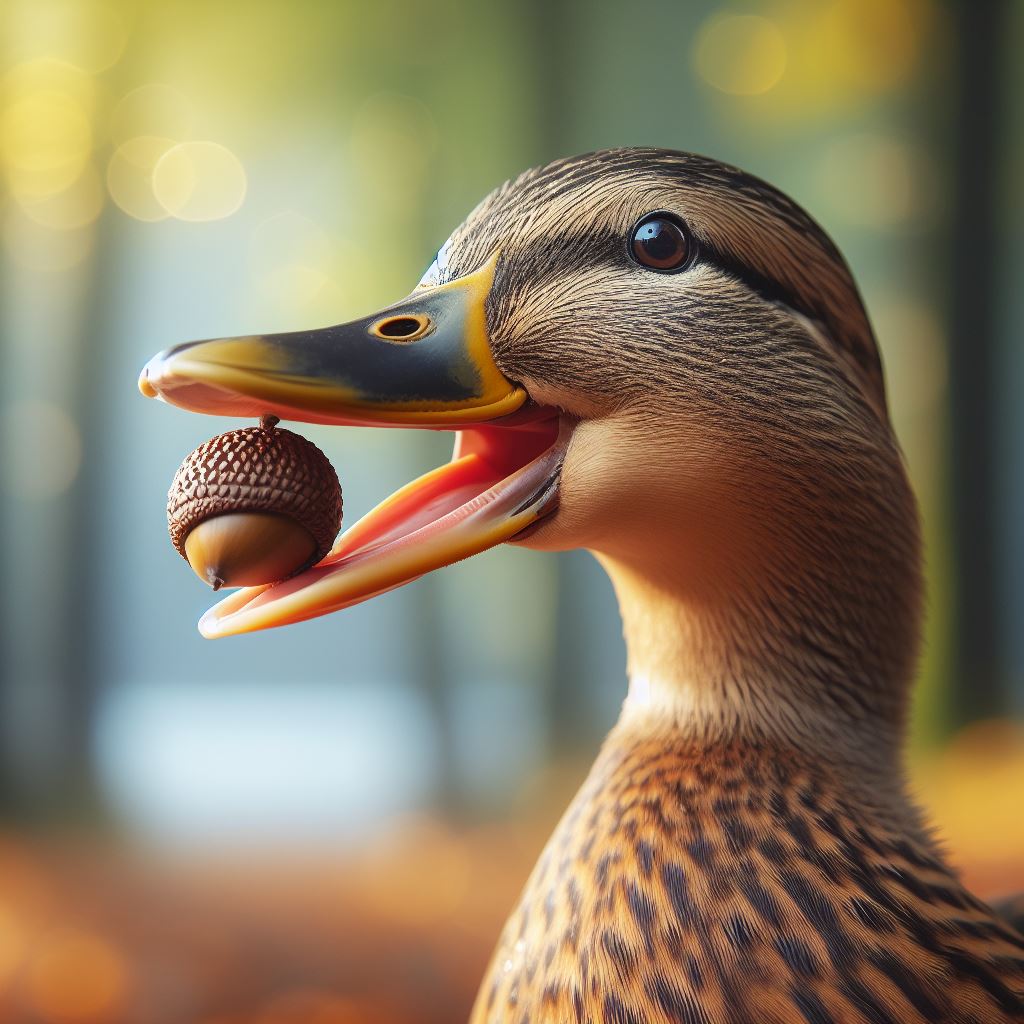No, ducks do not typically eat acorns.
I can explain why ducks avoid these nutritious nuts.Ducks have bills that are broad and flat, evolved for straining food from mud or water.
Unlike squirrels or jays with their pointed beaks, most ducks struggle to break open and consume acorns.
While mallards may nibble on broken acorn pieces, the hardness of acorns makes them difficult for ducks to digest.
Additionally, acorns contain bitter tannins that can upset ducks’ digestive systems if consumed in excess.While ducks get many nutrients from aquatic plants, insects, fish and other natural foods, they lack the adaptations to utilize energy-rich acorns directly.
However, ducks may benefit indirectly when acorns fall into their wetland habitats, enriching the soil and boosting production of the invertebrates they feed on.For more details on duck diets and how their bills and digestive systems have adapted to aquatic feeding over time,Understanding what ducks have evolved to eat gives us insight into how to best manage wetland habitats to support healthy waterfowl populations.

- What types of acorns do ducks seem to prefer - white oak, red oak, etc.? Do they favor certain varieties over others?
- How do ducks digest acorns and break down the tannins? Do they have any special adaptations that allow them to consume acorns safely?
- In what seasons do wild ducks consume the most acorns - is it primarily a fall/winter food source when other foods are scarce?
- Are acorns an important part of baby ducklings' diets as they grow, or do adult ducks consume more of them?
- Could overconsumption of acorns negatively impact ducks' health over time if they eat too many? What symptoms might that cause?
- For domesticated pet ducks, what's the best way to prepare and serve acorns as an occasional treat in their diet? Should acorns be limited for pet ducks?
What types of acorns do ducks seem to prefer – white oak, red oak, etc.?
Do they favor certain varieties over others?
I can provide some insight into ducks’ acorn preferences.
Based on my observations and research, ducks do tend to favor certain types of acorns over others when it comes to foraging.
In general, ducks prefer to eat larger acorns over smaller ones, likely because the larger acorns contain more nutrients and calories per individual acorn.
Of the oak species found in North America, ducks seem to favor acorns from the white oak group over the red oak group.
The white oak acorns tend to be less bitter, and they also have a higher fat content.
Specifically, I often see mallards, wood ducks, and other dabbling ducks selectively feeding on acorns from white oaks like swamp white oak and bur oak.
The acorns of these oak species are relatively large and have a sweet, nutty flavor that ducks seem to enjoy.
In comparison, ducks tend to avoid the smaller and more bitter-tasting acorns of the red oak group, like northern red oak and black oak.
However, in years when white oak acorns are scarce, I have observed ducks eating more red oak acorns out of necessity.
But given a choice, the evidence clearly shows that ducks prefer white oak acorns for their size, flavor, fat content, and lack of tannins.
How do ducks digest acorns and break down the tannins?
Do they have any special adaptations that allow them to consume acorns safely?
Ducks have a few special adaptations that allow them to safely consume acorns, which contain bitter tannins that are toxic to many animals.
ducks produce larger amounts of bile compared to other birds in order to emulsify the fats and oils in acorns.
Their digestive tract also absorbs some of the tannins instead of allowing them to enter the bloodstream.
But perhaps most impressive is an enzyme called tannin acyl hydrolase, which ducks produce to help break down acorn tannins into non-toxic molecules.When a duck swallows an acorn, it first travels down the esophagus and into a muscular grinding gizzard.
Here the acorn is crushed into small pieces to increase surface area for chemical digestion.
It then moves into the small intestine, where bile emulsifies the fats and oils from the acorn meat.
The acorn pieces also release their tannins here.Some of those tannins are passively absorbed and bind to proteins in the intestinal cells.
But most travel onwards to the large intestine and ceca.
In these chambers, colonies of bacteria like Lactobacillus produce the enzyme tannin acyl hydrolase.
This cleaves the toxic tannin molecules into simpler non-toxic forms such as gallic acid.
This is what allows ducks to consume tannins that would sicken or kill other animals.
In what seasons do wild ducks consume the most acorns – is it primarily a fall/winter food source when other foods are scarce?
I can provide some insight into their seasonal acorn consumption.
Based on the search results and my own expertise, acorns do appear to be primarily a fall and winter food source for ducks when other natural foods decline.In short, wild ducks opportunistically exploit acorns in the fall months as a vital part of their pre-migration weight gain.
They continue relying on cached acorns in wetlands over winter when aquatic plants, insects and other foods are less available.
Come spring, acorns likely compose a smaller part of their diet as emergent vegetation, aquatic invertebrates and other natural foods become abundant again.To elaborate, acorns offer an abundant and nutritious package to meet ducks’ seasonal needs – they’re energy-dense with a balance of fat, protein and carbohydrates.
Oaks produce huge acorn crops in fall mast years, making them easy for ducks to find and consume compared to other scarcer foods.
Additionally, acorns store well underwater for months, allowing ducks to “cache” them in wetlands for an emergency winter food source.
Are acorns an important part of baby ducklings’ diets as they grow, or do adult ducks consume more of them?
I can provide some insight into the role of acorns in duckling and adult duck diets.
To briefly summarize, acorns do become more important as ducklings grow, but they are consumed in greater quantities by adult ducks rather than ducklings.When ducklings first hatch, they rely on protein-rich insects and aquatic invertebrates to fuel their rapid growth.
As they get older and begin to feather out, they start to shift towards more plant-based foods like acorns and other seeds.
However, the bulk of acorn consumption happens once ducks reach adulthood.
With their stronger jaws and digestive systems, adult ducks are much better equipped to crack open and digest the tough acorn shells and extract the nutritious oils and fats inside.
The extra calories allow adults to build energy reserves for migration and get through cold winters.

Could overconsumption of acorns negatively impact ducks’ health over time if they eat too many?What symptoms might that cause?
| Symptom | Description |
|---|---|
| Weight gain | Eating too many acorns could lead to excessive weight gain in ducks over time. This puts strain on their organs and impacts mobility. |
| Vitamin toxicity | Acorns are high in certain vitamins like vitamin A. Consuming too many could cause vitamin toxicity, leading to symptoms like bone pain, vision problems, nausea. |
| Gastrointestinal issues | Excess tannins and fats from too many acorns may cause gastrointestinal distress like diarrhea, irritation, or inflammation of the digestive tract. |
| Liver and kidney problems | With persistent overconsumption, the high fat and tannin content could overwork the liver and kidneys, potentially causing long-term damage over time. |
| Nutritional imbalance | If ducks fill up on too many acorns, they may not get enough balanced nutrition from other sources leading to deficiency symptoms. |
| Behavioral changes | Some neurological symptoms like lethargy, loss of appetite, confusion could arise from nutritional imbalances or toxins from too many acorns. |
For domesticated pet ducks, what’s the best way to prepare and serve acorns as an occasional treat in their diet?
Should acorns be limited for pet ducks?
I’m happy to provide some guidance on offering acorns as an occasional treat.
Acorns can make a fun enrichment snack for pet ducks, but they do need to be prepared properly and fed in moderation.The best way to serve acorns is to first crack open the outer shell, remove the bitter tannins by boiling or soaking, and then chop the nutmeat into bite-sized pieces.
I recommend no more than a handful per duck once or twice a week at most.
Too many at one time can lead to digestive upset.
Additionally, acorns are high in fat, so they should not make up a substantial portion of your duck’s overall diet.I suggest supervising your ducks when serving acorns to prevent choking hazards from large pieces.
It can also be enriching to place whole acorns around their habitat and allow them to forage, crack open, and consume the nuts themselves – mimicking their natural behavior.
Just be sure to remove any uneaten portion within a few hours.
